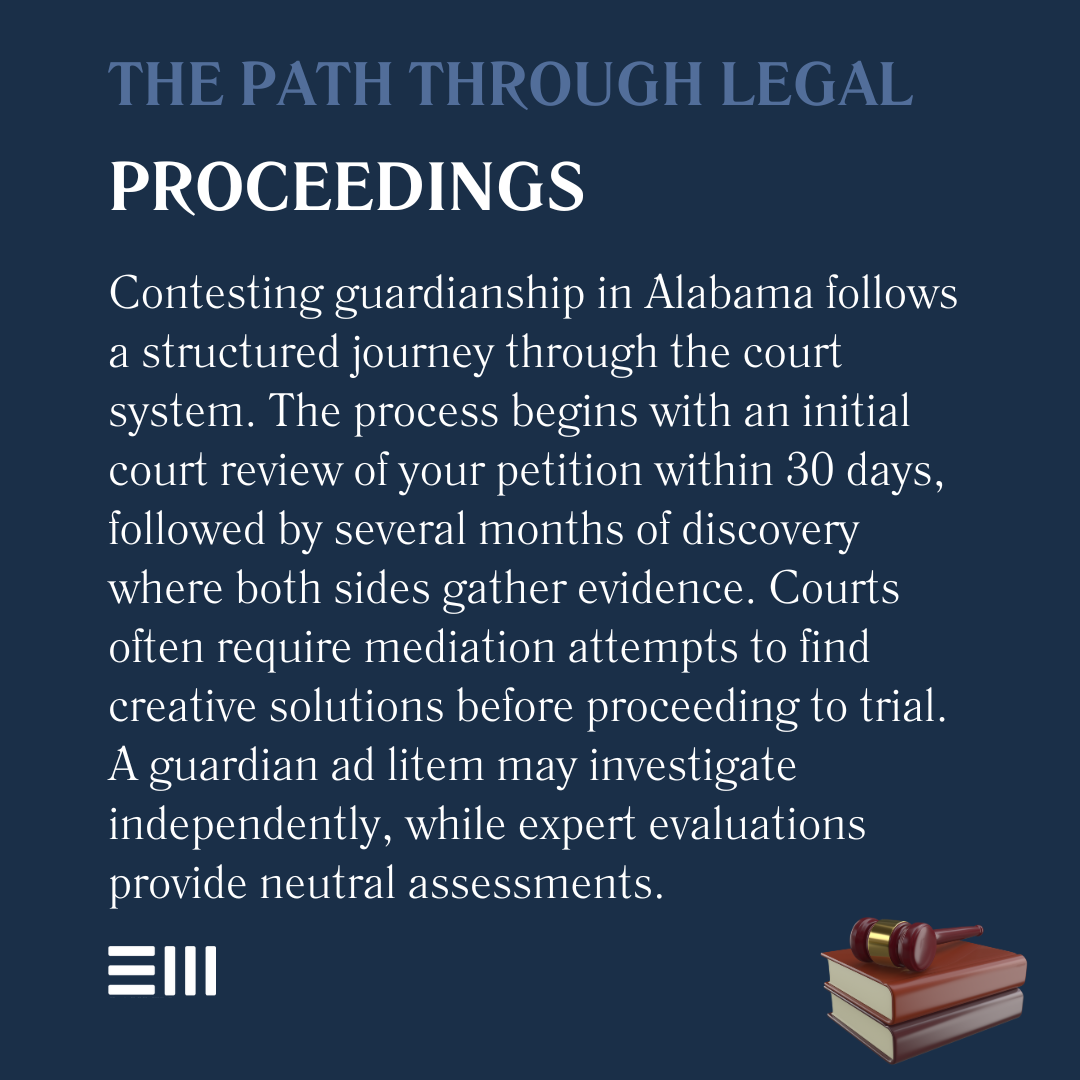Every voice deserves to be heard in matters of personal autonomy. When questions arise about the necessity or appropriateness of a guardianship, Alabama law provides clear pathways to challenge these arrangements.
From protecting individual rights to ensuring proper care, understanding how to contest guardianship in Alabama empowers families to advocate effectively for their loved ones' best interests.
Grounds for Contesting Guardianship
Before initiating a challenge to guardianship, understanding the valid legal grounds helps build a strong foundation for your case.
Alabama courts carefully consider several factors when evaluating guardianship contests.
- Capacity Recovery: Evidence that the ward has regained sufficient capacity to manage their own affairs through medical improvement or rehabilitation.
- Guardian Misconduct: Documentation of actions that harm the ward's interests, including financial mismanagement or neglect of duties.
- Less Restrictive Alternatives: Demonstration that other arrangements could meet the ward's needs while preserving more autonomy.
- Procedural Errors: Identification of legal mistakes in the original guardianship proceedings that affect their validity.
These grounds form the basis for successful guardianship challenges when properly documented and presented.
Filing Requirements and Deadlines
The process of contesting a guardianship in Alabama involves specific legal requirements and timing considerations.
Understanding these elements ensures proper submission of your challenge.
- Petition Content: Your filing must detail the specific reasons for contest, including supporting evidence and requested relief.
- Standing Requirements: Verification that you have legal standing to bring the challenge as an interested party.
- Time Limitations: Adherence to filing deadlines, which vary based on the type of challenge and when you learned of the issues.
- Service Requirements: Proper notification to all interested parties, including the current guardian and other family members.
Meeting these requirements helps prevent procedural dismissals and moves your case forward.
Evidence Collection and Documentation
Strong evidence forms the cornerstone of successful guardianship challenges. Gathering and organizing appropriate documentation strengthens your position and demonstrates the merit of your concerns to the court.
Proper preparation in this area often determines the outcome of guardianship contests.
- Medical Evaluations: Recent assessments of the ward's mental and physical capabilities from qualified professionals, including detailed neurological evaluations, psychiatric assessments, and physical capacity determinations. These evaluations should specifically address the ward's decision-making abilities and capacity for self-care. Independent evaluations from multiple specialists often carry more weight than single assessments.
- Financial Records: Documentation of any financial mismanagement or concerning transactions under the current guardianship, including bank statements, investment records, property transactions, and expense reports. Look for patterns of unusual spending, unauthorized transactions, or decisions that don't align with the ward's best interests. Include documentation of the ward's historical financial management practices for comparison.
- Care Documentation: Records showing the quality of care provided and any deficiencies under the current arrangement, including medical appointment histories, medication management logs, and daily care records. Document any instances of neglect, improper care, or failure to follow medical recommendations. Include reports from care facilities, home health providers, and other professional caregivers.
- Witness Statements: Testimonials from individuals with direct knowledge of the situation and concerns, including family members, healthcare providers, financial advisors, and social workers. These statements should provide specific examples and observations rather than general opinions. Include contact information and professional credentials for expert witnesses.
- Communication Records: Documented attempts to address concerns with the current guardian, including emails, letters, and records of conversations. Save any responses or lack of response to demonstrate your efforts to resolve issues before pursuing legal action.
- Historical Documentation: Records establishing the ward's previous wishes, including any advance directives, powers of attorney, or expressed preferences about care and financial management. Include documentation of the ward's lifestyle, values, and decisions before guardianship to demonstrate departures from their established patterns.
Proper organization and presentation of evidence support your challenge and help the court make informed decisions.
Creating a clear timeline of events and maintaining a detailed index of all documentation helps ensure nothing important is overlooked.
Legal Process and Hearings
Understanding the legal process helps you prepare for each stage of your guardianship challenge.
Courts follow specific procedures to ensure fair consideration of all concerns while protecting the interests of the ward throughout the proceedings.
- Initial Review: The court examines your petition to ensure it meets basic requirements and merits further proceedings. This review typically occurs within 30 days of filing and focuses on whether you have standing to bring the challenge and if your allegations, if proven, would justify modifying or terminating the guardianship. The court may schedule an initial hearing to clarify any questions about your petition.
- Discovery Phase: Both sides can request relevant documents and information to support their positions. This process includes written interrogatories, requests for production of documents, and depositions of witnesses. Discovery often reveals additional evidence that either strengthens your case or helps you realize when settlement might be appropriate. Expect this phase to last several months, depending on case complexity.
- Mediation Options: Courts may require attempted resolution through mediation before proceeding to trial. Mediation provides an opportunity to explore creative solutions with the help of a neutral third party. Even if full resolution isn't achieved, mediation often helps narrow the issues for trial and can lead to partial agreements that benefit the ward.
- Guardian ad Litem: The court may appoint a guardian ad litem to independently investigate the situation and report findings to the court. This individual serves as an objective party focused solely on the ward's best interests, often interviewing all involved parties and reviewing relevant documentation.
- Expert Evaluations: The court might order independent evaluations of the ward's condition or require expert testimony about specific aspects of the case. These evaluations provide neutral, professional assessments to help the court make informed decisions.
- Court Hearings: Formal presentation of evidence and arguments before a judge who will decide the outcome. Hearings may address specific motions or preliminary matters before the final trial. The ward has the right to attend these hearings unless their presence would be detrimental to their wellbeing.
- Final Disposition: After considering all evidence and testimony, the court issues its ruling. This may include maintaining, modifying, or terminating the guardianship, potentially with specific conditions or requirements for moving forward.
Preparing for each stage helps you present your case effectively and understand what to expect throughout the process.
Maintain detailed records of all court communications and deadlines to ensure compliance with procedural requirements.
Alternative Solutions
Sometimes, alternatives to full contestation better serve everyone's interests.
Consider these options when planning your approach.
- Guardianship Modification: Requesting changes to the current arrangement rather than complete termination.
- Supported Decision-Making: Implementing less restrictive alternatives that preserve more autonomy.
- Co-Guardianship: Adding another guardian to provide oversight and shared responsibility.
- Limited Guardianship: Reducing the scope of guardian authority while maintaining necessary protections.
Exploring these alternatives may lead to solutions that better serve all parties' interests.
Frequently Asked Questions About Contesting Guardianship in Alabama
The process of challenging a guardianship raises many important questions.
Here are answers to common concerns that arise during guardianship contests.
How Long Does the Contest Process Take?
The timeline varies based on case complexity and court schedules, typically ranging from three months to over a year.
What Rights Does the Ward Have During the Contest?
The ward retains certain fundamental rights, including the right to legal representation and to participate in proceedings.
Can Family Members Contest a Professional Guardian?
Yes, family members with standing can challenge professional guardians just as they can family guardians.
What Happens if the Contest Succeeds?
The court may terminate or modify the guardianship, potentially appointing a new guardian or implementing alternative arrangements.
Who Pays for the Legal Costs of a Contest?
Costs may be paid from the ward's estate if the challenge serves their best interests, otherwise parties typically bear their own expenses.
Building Your Path Forward
Challenging a guardianship represents a significant step toward protecting your loved one's rights and ensuring proper care.
Our experienced legal team can help evaluate your situation and develop an effective strategy for pursuing appropriate changes.
Contact us today to discuss your concerns and explore options for contesting guardianship.
Our Alabama guardianship attorneys will help you understand the process and move forward with confidence.


